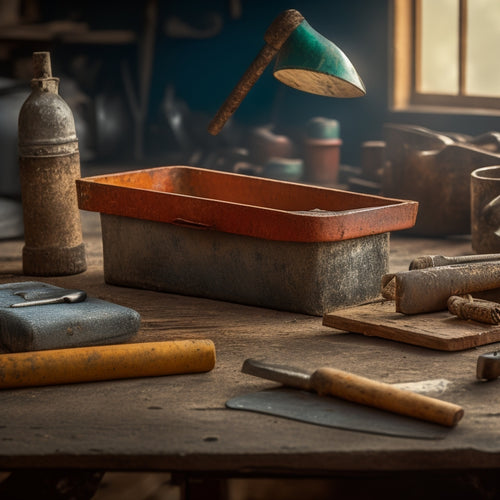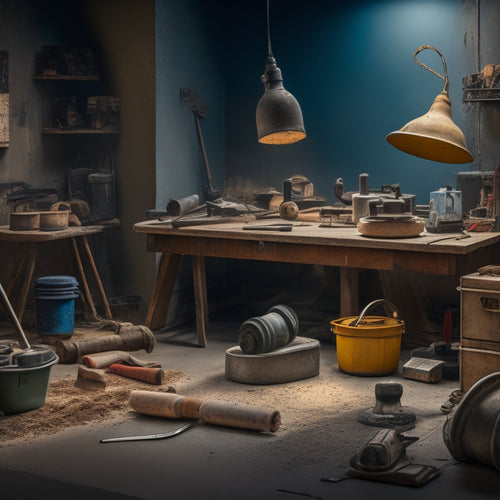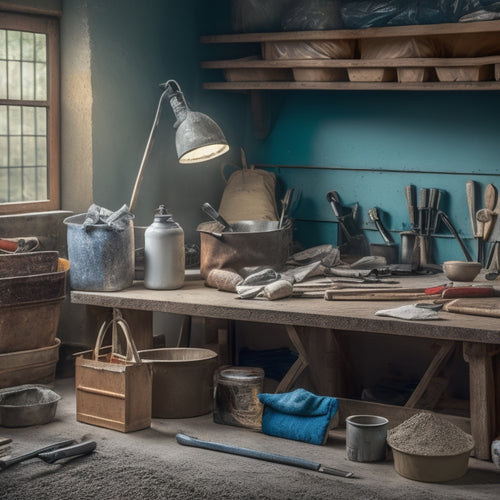
7 Best Concrete Tools for Fast Home Repairs
Share
You're about to tackle a concrete repair project, and you need the right tools to get the job done quickly and efficiently. For a smooth finish, you'll need a reliable trowel, and for setting concrete anchors, a powerful drill is essential. A mixer for small batches will help reduce waste, while an edger will give you clean lines. A float is crucial for even surfaces, and a high-torque grinder will speed up removal tasks. Finally, a precise chisel will help with delicate tasks. With these seven tools in your arsenal, you'll be well-equipped to tackle your project - and discovering their features and techniques will help you master the job.
Key Takeaways
• For efficient concrete repairs, essential tools include trowels, drills, mixers, edgers, floats, grinders, and chisels, each serving a specific purpose.
• High-torque grinders facilitate up to 50% faster material removal, increased precision, and longer tool life, making them ideal for challenging tasks.
• Drills with a minimum torque output of 500 in-lbs or 60 Nm are necessary for efficiently setting concrete anchors, ensuring safe and successful installation.
• Mixers with compact size and adjustable speed controls are perfect for mixing small quantities of concrete, reducing waste and saving time.
• Edgers and floats are crucial for achieving clean lines and even surfaces in concrete projects, enhancing the appearance of the finished product.
Essential Trowel for Smooth Finishing
You'll need a high-quality trowel to achieve a smooth, even finish on your concrete repairs, as it's the most essential tool for applying and spreading material evenly. There are several trowel types to choose from, including V-notched, square-notched, and smooth-edged trowels. Each type is suited for specific finishing techniques and concrete mixes. For example, a V-notched trowel is ideal for applying thin layers of material, while a square-notched trowel is better suited for thicker applications.
When selecting a trowel, consider the size and weight that feels comfortable for you. A larger trowel may cover more surface area, but it can be heavy and difficult to maneuver. Look for a trowel with a sturdy handle and a rust-resistant blade.
It's also essential to maintain your trowel by cleaning it regularly and storing it in a dry place. By choosing the right trowel and mastering various finishing techniques, you'll be able to achieve a professional-looking finish on your concrete repairs.
Remember to always follow safety guidelines when working with concrete, and take necessary precautions to avoid accidents.
Powerful Drill for Concrete Anchors
When it comes to setting concrete anchors, a powerful drill is essential for getting the job done efficiently and effectively. You don't want to be stuck with a drill that can't handle the task, leaving you frustrated and wasting precious time.
That's why it's vital to choose a drill with sufficient power ratings to tackle various concrete anchor types. Look for a drill with a high torque output, usually measured in units of inch-pounds (in-lbs) or Newton-meters (Nm). A minimum of 500 in-lbs or 60 Nm is recommended for most concrete anchor applications.
Additionally, consider a drill with a high RPM (revolutions per minute) rating, typically above 1,500 RPM, to guarantee efficient drilling. When selecting a drill, also think about the type of concrete anchor you're working with.
For example, if you're using sleeve anchors or anchor bolts, you may need a more powerful drill to penetrate the concrete effectively. By choosing the right drill for your concrete anchor types, you'll guarantee a safe and successful installation.
Versatile Mixer for Small Batches
When you're working on DIY projects, you often need to mix small quantities of concrete.
That's where a versatile mixer for small batches comes in - you'll be able to mix exactly what you need without wasting materials or time.
With this tool, you'll be able to tackle those small concrete repairs and projects with ease.
Mix Small Quantities Easily
With small batches, a versatile mixer is essential for efficiently mixing concrete to the right consistency.
When you're working with small quantities, you need a mixer that can handle the job without wasting materials or time. Look for a mixer that's designed for small batch preparation, with a compact size and adjustable speed controls. This will give you the flexibility to mix small amounts of concrete to the perfect consistency, every time.
To get the most out of your mixer, it's important to develop good mixing techniques.
Start by adding the right amount of water to the mix, then gradually add the cement and aggregates. Use a slow, consistent motion to combine the ingredients, scraping the sides of the mixer as you go. This will help to guarantee a smooth, even consistency that's perfect for your repair job.
Perfect for DIY Projects
You'll find that a versatile mixer for small batches is perfect for DIY projects, allowing you to tackle a wide range of repairs and renovations with precision and control.
With this essential tool, you can mix small quantities of concrete, mortar, or stucco, making it ideal for tasks like patching cracks, filling holes, or creating decorative elements.
As a DIY enthusiast, you know that having the right tools is vital for a successful project. A versatile mixer guarantees you can complete your tasks efficiently and safely.
When it comes to concrete repair tips, having a mixer that can handle small batches is a game-changer. You can mix just the right amount of material, reducing waste and mess.
Plus, you'll have more control over the consistency and texture of your mix, assuring a professional-looking finish.
As one of the DIY project essentials, a versatile mixer for small batches is a worthwhile investment for any homeowner or DIYer.
With it, you'll be able to tackle a variety of projects with confidence, knowing you have the right tool for the job.
Heavy-Duty Edger for Clean Lines
Your heavy-duty edger's robust design and powerful motor allow it to cut through concrete with ease, producing clean, precise lines that elevate the overall appearance of your repair job. This tool isn't just limited to concrete repairs; it's also ideal for various landscaping applications, such as creating clean edges around gardens, sidewalks, and driveways.
Here are three essential edger techniques to master for professional-looking results:
-
Control your depth: Adjust the edger's blade to the correct depth to avoid damaging surrounding surfaces or creating uneven lines.
-
Maintain a steady pace: Move the edger at a consistent speed to achieve smooth, even cuts.
-
Use safety gear: Always wear protective gear, including safety glasses, gloves, and a dust mask, to prevent injuries and exposure to dust and debris.
Reliable Float for Even Surfaces
When you're working on a concrete project, you know how important it's to achieve a smooth, even surface.
That's where a reliable float comes in - it's a game-changer for preparing your surface for finishing.
With the right float, you can choose from a range of smooth finishing options and make surface preparation a whole lot easier.
Smooth Finishing Options
With a reliable float in hand, achieve even surfaces by using it to remove imperfections and excess concrete, creating a smooth finish that's ready for further refinement.
You're now ready to take your concrete repair to the next level with smooth finishing options.
When it comes to smoothing techniques, you have several options to choose from:
-
Troweling: Use a steel trowel to apply finishing materials like cement paste or concrete overlay, achieving a smooth, even surface.
-
Power troweling: For larger areas, use a power trowel to speed up the process and achieve a uniform finish.
-
Hand finishing: For smaller areas or detailed work, use hand finishing tools like edgers, groovers, or finishing trowels to add a professional touch.
Remember to always follow safety guidelines when working with power tools and to use the right finishing materials for your specific project.
Easy Surface Preparation
Get a head start on your concrete repair by using a reliable float to quickly remove imperfections and excess concrete, paving the way for a smooth, even surface. This essential tool helps you achieve a uniform base for your repair, ensuring a strong and durable bond between the old and new concrete. When choosing a float, look for one with a sturdy handle and a dense, flat blade that can withstand heavy use.
Before you start floating, make sure to assess the substrate using reliable assessment methods to identify any cracks, voids, or other defects that may affect the repair.
Then, use effective surface cleaning techniques to remove dirt, oil, or other contaminants that could compromise the bond. With a clean and even surface, you can apply your repair material with confidence, knowing it will adhere properly and last for years to come.
High-Torque Grinder for Fast Removal
You'll cut through tough surfaces like concrete, stone, and metal with ease using a high-torque grinder, making it an essential tool for fast removal in your home repair projects. The high torque advantages of these grinders allow you to tackle even the most challenging tasks with confidence.
Here are three key benefits to evaluate:
-
Faster removal: High-torque grinders can remove material up to 50% faster than standard grinders, saving you time and energy.
-
Increased precision: With more power at your disposal, you'll have greater control over the grinding process, reducing the risk of accidents and improving overall safety.
-
Longer tool life: Proper grinder maintenance, such as regular cleaning and inspection, can extend the life of your high-torque grinder, making it a valuable investment for your toolkit.
Precise Chisel for Delicate Tasks
Precise Chisel for Delicate Tasks
This precise chisel is designed for delicate tasks that require finesse, allowing you to carefully break up and remove old mortar, tile adhesive, or other stubborn substances without damaging the surrounding surface. With precision cutting, you can tackle tasks that demand accuracy and control. To get the most out of this tool, it is crucial to master various chisel techniques.
Here are some key benefits of using a precise chisel:
| Task | Technique | Benefit |
|---|---|---|
| Removing old mortar | Gentle tapping | Prevents damage to surrounding surface |
| Breaking up tile adhesive | Controlled prying | Guarantees clean removal without residue |
| Scraping off old paint | Smooth, even strokes | Leaves surface smooth and even |
| Chiseling concrete | Precise, angled cuts | Reduces dust and debris |
| Debris removal | Scooping motion | Safely collects debris without spreading it |
Frequently Asked Questions
What Safety Gear Is Essential for Working With Concrete Tools?
When working with concrete tools, you can't afford to skimp on safety gear.
First and foremost, you need safety goggles to protect your eyes from flying debris and dust. Don't even think about starting a project without them!
Additionally, invest in a good pair of protective gloves to shield your hands from cuts, abrasions, and harsh chemicals.
Trust us, it's better to be safe than sorry - your health and well-being depend on it.
Can I Use Concrete Tools for Other Building Materials Too?
You're wondering if you can use your concrete tools for other building materials too.
The good news is, many concrete tools offer versatility and can be used with alternative materials. For instance, a hammer drill can be used for masonry, brick, or even stone.
However, it's essential to check the tool's specifications and adjust settings accordingly to avoid damage or safety risks.
Always prioritize caution and follow manufacturer guidelines when exploring concrete tool versatility for alternative materials usage.
How Do I Store and Maintain Concrete Tools for Longevity?
As you tuck away your concrete tools, imagine a well-oiled machine humming in harmony - that's the sweet spot of tool organization!
You're one step ahead by prioritizing maintenance. Clean your tools after each use, store them in a dry place, and regularly inspect for wear.
Follow these maintenance tips to extend their lifespan. A little TLC now saves you from costly replacements and guarantees a safe, efficient workflow down the line.
Are Concrete Tools Suitable for DIY Home Repairs or Just Professionals?
When tackling DIY concrete projects, you might wonder if the tools are suitable for your skills or if they're only meant for professionals.
The truth is, you can use concrete tools for DIY home repairs, but it's essential to choose the right ones for your project's scope and your level of expertise.
Don't try to use professional equipment if you're not trained to handle it - prioritize safety and opt for DIY-friendly tools that fit your needs.
Can I Rent Concrete Tools Instead of Buying Them Outright?
You're considering renting concrete tools instead of buying them outright, and that's a smart move.
Tool rental services offer a cost-effective solution, especially for infrequent or one-time projects.
Before making a decision, do a cost comparison: calculate the rental fees versus the purchase price of the tools you need.
Factor in the duration of your project and the frequency of use to determine which option is more budget-friendly for you.
Conclusion
You've finally got the right concrete tools for the job, and you're ready to tackle that pesky repair.
Ironically, the most time-consuming part of the process is now over - gathering the right gear.
The actual fixing? That's the easy part.
With these 7 essentials, you'll be done before you know it, and wondering why you ever put it off in the first place.
Related Posts
-

Smart Guide to Buying Used Concrete Hand Tools
You're about to buy used concrete hand tools, and you need to get it right. Dedicate time to identify the tools you n...
-

Top Concrete Resurfacing Tools for a Pro Finish
When it comes to achieving a professional finish in concrete resurfacing projects, you require the right set of speci...
-

10 Must-Have Tools for Small Concrete Projects
When tackling small concrete projects, you'll need a range of essential tools to achieve professional-grade results. ...


